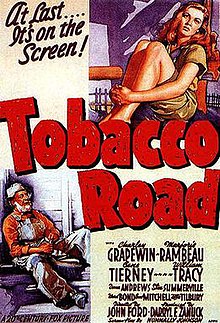Tobacco Road (film)
| Tobacco Road | |
|---|---|

Theatrical release poster
|
|
| Directed by | John Ford |
| Produced by | Darryl F. Zanuck |
| Written by |
|
| Starring | |
| Music by | David Buttolph |
| Cinematography | Arthur C. Miller |
| Edited by | Barbara McLean |
| Distributed by | Twentieth Century-Fox Film Corporation |
|
Release date
|
|
|
Running time
|
84 minutes |
| Country | United States |
| Language | English |
| Box office | $1,900,000 (USA) (1973) |
Tobacco Road is a 1941 film directed by John Ford starring Charley Grapewin, Marjorie Rambeau, Gene Tierney, William Tracy Dana Andrews and Ward Bond. It was based on the novel of the same name by Erskine Caldwell, but the plot was rewritten for the film.
Studios attempting to acquire the screen rights to the novel date back to 1933.RKO Pictures and Warner Bros. considered buying the rights, the first intending to assign Charles Laughton in the lead role, but were discouraged from doing so. In March 1940, Columbia Pictures showed interest, but was informed that Tobacco Road was on the list of banned titles. Eventually, 20th Century Fox won the rights in August 1940, with RKO as its main competitor. It was believed that Fox won due to the success of The Grapes of Wrath (1940). They were the main preference of the copyright holders Erskine Caldwell and Jack Kirkland, who were reluctant to sell the rights unless the film "would be picturized honestly and fearlessly."
Initially, Henry Hull was sought from Metro-Goldwyn-Mayer to reprise the main role previously portrayed on Broadway. However, in October 1940 he was revealed to be only in consideration, along with Walter Brennan and Henry Fonda.
Much to the "immense satisfaction of the studio",John Ford was signed on as the director as early as March 1940. On production, he commented in a December 1940 interview: "We have no dirt in the picture. We've eliminated the horrible details and what we've got left is a nice dramatic story. It's a tear-jerker, with some comedy relief. What we're aiming at is to have the customers sympathize with our people and not feel disgusted." The decision was most likely a result of a November 1940 warning that "many religious folk throughout the nation may be offended by the religious aspects."
...
Wikipedia
